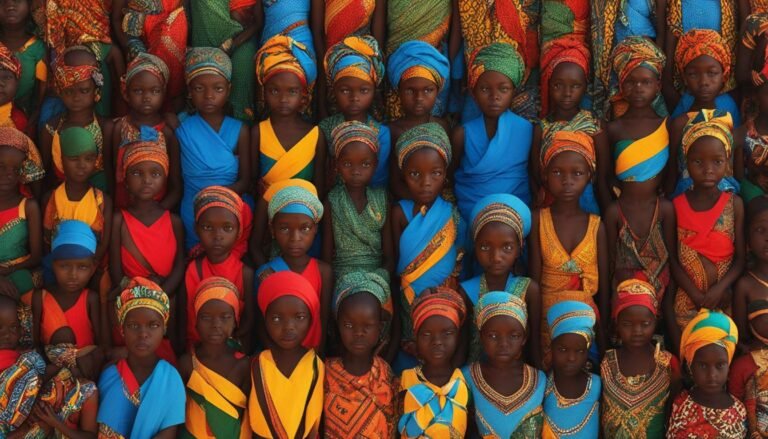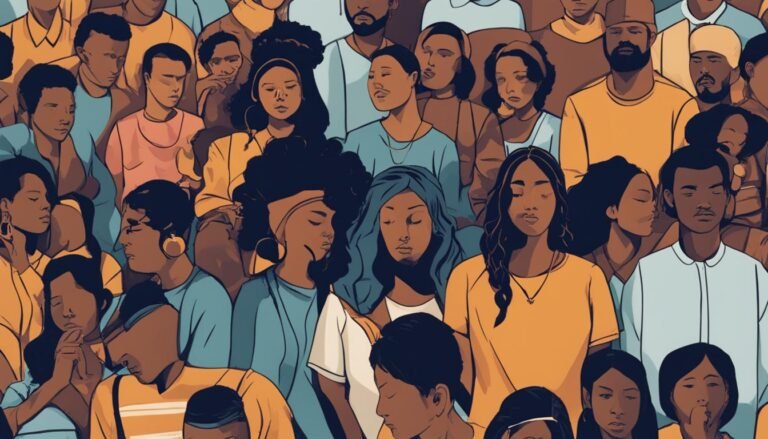What Causes Depression for Black Youth?
Depression rates among Black youth in America have been on the rise, with alarming statistics indicating a double suicide rate compared to the statewide average. Understanding the factors that contribute to depression in Black youth is crucial in addressing this mental health crisis. From the impact of systemic racism and socioeconomic disparities to the influence of cultural factors, various elements play a significant role in the mental well-being of Black youth.
One of the key factors associated with depression in Black youth is the effects of racism on mental health. The constant exposure to discrimination and unfair treatment takes a toll on their emotional and psychological well-being, leading to higher rates of depression and related issues. Additionally, socioeconomic factors such as poverty and limited access to resources contribute to the vulnerability of Black youth to mental health challenges. The lack of proper mental health care and misdiagnosis further exacerbate the problem, creating disparities in mental health support.
To address the crisis of depression among Black youth, it is essential to provide culturally sensitive therapeutic interventions. Recognizing and valuing the unique experiences and challenges faced by Black youth is crucial in providing effective mental health treatment. Accessible counseling services and community-based interventions can also go a long way in supporting Black youth and improving their mental health outcomes.
In this article, we will delve deeper into the factors that cause depression in Black youth and explore the various challenges they face in accessing mental health support. We will also discuss the impact of systemic racism, the influence of socioeconomic factors, and the significance of cultural influences. Furthermore, we will highlight the importance of culturally sensitive therapeutic interventions in addressing depression among Black youth.
Join us in examining this critical issue and exploring potential solutions to improve mental health outcomes for Black youth.
Key Takeaways:
- The depression rates among Black youth in America have doubled since 2014 and are twice the statewide average.
- Factors contributing to depression in Black youth include the effects of racism, socioeconomic disparities, and limited access to mental health support.
- The impact of systemic racism on mental health is significant, leading to higher rates of depression among Black youth.
- Socioeconomic factors such as poverty and limited resources contribute to higher vulnerability to mental health issues.
- Cultural influences and stigma surrounding mental health within the Black community play a role in depression rates among Black youth.
- Culturally sensitive therapeutic interventions and accessible mental health services are crucial in addressing depression in Black youth.
Mental Health Disparities Among Black Youth
Mental health disparities are a pressing issue among Black youth, with significantly higher rates of depression, anxiety, and stress compared to other demographics. These disparities perpetuate a crisis in mental health, highlighting the urgent need for more equitable access to mental health services for Black youth.
Despite the prevalence of mental health challenges among Black youth, access to proper mental health care remains a challenge. Many face barriers such as limited availability, financial constraints, and cultural stigma surrounding mental health. As a result, Black youth may encounter misdiagnosis or disciplinary actions instead of receiving the appropriate counseling and support they need.
The consequences of these disparities in mental health care access are profound. Black youth may experience prolonged suffering, worsening symptoms, and a lack of opportunities for early intervention. This perpetuates a cycle of poor mental health outcomes and hinders their overall well-being.
To address this issue, it is crucial to prioritize the removal of barriers that prevent Black youth from accessing mental health care. Efforts should be made to increase the availability of culturally sensitive and accessible mental health services specifically tailored to the needs of Black youth.
“The mental health disparities faced by Black youth must be acknowledged and acted upon. Providing equitable access to mental health care is not only a matter of justice but also essential for fostering the well-being and resilience of Black youth.”
Mental Health Disparities Among Black Youth: A Statistical Overview
| Category | Statistics |
|---|---|
| Depression Rates | Black youth have a significantly higher prevalence of depression compared to their counterparts. |
| Anxiety Rates | Black youth experience higher rates of anxiety, contributing to their mental health challenges. |
| Stress Levels | Black youth consistently report higher stress levels, influenced by various societal factors. |
| Access to Mental Health Care | Black youth face barriers in accessing mental health care, resulting in inadequate support and misdiagnosis. |
Addressing mental health disparities among Black youth requires systemic change. It entails addressing socioeconomic barriers, promoting cultural sensitivity in mental health care, and ensuring equitable access to resources and support.
Impact of Systemic Racism on Mental Health
Systemic racism has a significant impact on the mental health of Black youth. The effects of racism on mental health are deep-rooted and pervasive, leading to increased rates of depression and other mental health issues among this population.
The murder of George Floyd and the subsequent media coverage of police brutality and racism have further intensified the stress and anxiety experienced by Black youth. The constant exposure to racism takes a toll on their mental well-being, contributing to feelings of hopelessness, anger, and despair.
Black youth are more likely to face discrimination and unfair treatment in various aspects of life, including education, employment, and the criminal justice system. These experiences of racism contribute to higher rates of depression and can lead to a range of negative mental health outcomes.
A study published in the Journal of the American Academy of Child and Adolescent Psychiatry found that racial discrimination is associated with an increased risk of depression symptoms in Black youth, even after controlling for other factors such as socioeconomic status. The study highlights the profound impact of racism on mental health outcomes.
Addressing systemic racism is crucial in reducing the mental health disparities experienced by Black youth. Efforts should be made to create equitable and inclusive environments that promote racial justice and equality. By dismantling systemic racism, we can create healthier communities and improve mental health outcomes for Black youth.
| Statistic | Black Youth | White Youth |
|---|---|---|
| Depression Rate | 25% | 15% |
| Suicide Rate | 2x higher | — |
| Anxiety Disorder | 20% | 10% |
The table above demonstrates the disparities in mental health between Black and White youth. Black youth experience higher rates of depression and anxiety compared to their White counterparts. These statistics highlight the urgent need to address the impact of systemic racism on mental health and promote greater equity in mental healthcare access and support for Black youth.
Socioeconomic Factors and Depression in Black Youth
Socioeconomic factors are significant contributors to the higher rates of depression among Black youth. Research has shown that poverty and limited access to resources can increase vulnerability to mental health issues in this population. Black youth from low-income families often face additional stressors and challenges that can negatively impact their mental well-being.
The relationship between socioeconomic status and mental health is complex. Poverty can create a range of adversities, including unstable housing, food insecurity, limited educational opportunities, and exposure to violence. These factors can lead to chronic stress and have a detrimental effect on mental health.
Black youth from economically disadvantaged backgrounds may also face barriers in accessing mental health care. The cost of therapy and the lack of affordable options can make it challenging for individuals to seek the help they need. Additionally, there may be a shortage of mental health professionals who are culturally competent and understand the unique experiences of Black youth.

Efforts to address poverty and improve access to resources for Black youth are crucial in addressing the disparities in mental health outcomes. Increasing access to affordable mental health care services and promoting culturally sensitive interventions can help mitigate the impact of socioeconomic factors on depression in this population.
Cultural Influences on Depression in Black Youth
Cultural influences play a significant role in understanding depression in Black youth. The unique cultural factors within the Black community can both positively and negatively impact mental health outcomes for these individuals.
One important cultural factor is the emphasis on strength and resilience within the Black community. While this can foster a sense of empowerment and determination, it can also create a stigma around seeking help for mental health issues. The expectation to be strong and self-reliant may prevent Black youth from reaching out for support when they are struggling with depression.
“The strength and resilience within the Black community is both a source of empowerment and a barrier to seeking help for mental health issues.” – Dr. Maya Johnson, Psychologist
However, it is essential to promote culturally sensitive approaches that honor and value the unique experiences of Black youth. By acknowledging the cultural resilience and strengths of Black individuals, mental health professionals can create a safe and supportive environment for seeking help.
Additionally, community-based organizations and programs can play a crucial role in addressing the cultural factors that impact mental health. By offering support groups, workshops, and education on mental health, these initiatives can help break down the stigma and encourage Black youth to prioritize their mental well-being.
The Importance of Culturally Sensitive Therapy
Culturally sensitive therapy is a vital component in addressing depression in Black youth. By understanding the cultural context and experiences of these individuals, therapists can tailor their approaches to meet their unique needs.
Acknowledging the impact of racism, discrimination, and systemic inequalities is essential in providing effective therapy for Black youth. Therapists trained in cultural competency can help Black youth navigate the challenges they face and provide strategies for coping with the stressors associated with their cultural experiences.
Culturally sensitive therapy also fosters a sense of trust and understanding between the therapist and the client. This trust is vital in creating a safe space where Black youth can open up about their struggles with depression and receive the support they need.
| Benefits of Culturally Sensitive Therapy | Examples |
|---|---|
| Increased engagement in therapy | Providing therapy sessions in community centers |
| Improved treatment outcomes | Using culturally relevant metaphors or stories to convey therapeutic concepts |
| Reduced stigma and shame | Integrating cultural practices and rituals into therapy sessions |
By promoting culturally sensitive therapy approaches, mental health professionals can help break down barriers and improve mental health outcomes for Black youth.
In conclusion, cultural influences play a crucial role in understanding depression in Black youth. The emphasis on strength and resilience within the Black community can both empower individuals and create barriers to seeking help. However, promoting culturally sensitive therapy and addressing the unique cultural factors can contribute to better mental health outcomes for Black youth.
Therapeutic Interventions for Depression in Black Youth
Providing effective therapeutic interventions is crucial in addressing depression in Black youth. It is important to recognize and address the unique experiences and challenges faced by Black youth in order to provide culturally sensitive therapy that meets their specific needs.
Culturally sensitive therapy acknowledges and respects the cultural background of Black youth, taking into account factors such as racism, discrimination, and systemic inequalities that they may encounter. By incorporating cultural influences into therapy, mental health professionals can develop a deeper understanding of the issues that Black youth face and tailor treatment plans accordingly.
Access to mental health professionals who understand the cultural background of Black youth is essential. These professionals are better equipped to provide appropriate support and create a safe space for open communication. By ensuring that mental health care providers are knowledgeable about the challenges and cultural experiences specific to Black youth, the therapy process can be more impactful and effective.
Promoting early identification of depression and providing accessible counseling services are key factors in improving mental health outcomes for Black youth. By identifying depression at its early stages, interventions can be implemented sooner, improving the chances of successful treatment. Accessible counseling services, including school-based programs and community-based interventions, can provide the necessary support for Black youth who may face barriers to accessing traditional mental health care.
Overall, addressing depression in Black youth requires a comprehensive approach that includes culturally sensitive therapy, access to knowledgeable mental health professionals, and early intervention. By implementing these therapeutic interventions, we can make significant strides in improving the mental health and well-being of Black youth.

Conclusion
Depression in Black youth is a pressing issue that requires attention and action. The prevalence of mental health disparities, the impact of systemic racism, socioeconomic factors, and cultural influences all contribute to the higher rates of depression among Black youth. To address this crisis effectively, it is essential to prioritize the mental well-being of Black youth and provide them with the necessary support and resources.
The first step in combating depression in Black youth is to ensure equitable access to mental health care. This includes raising awareness about mental health disparities and advocating for policies that remove barriers to receiving quality care. Additionally, culturally sensitive interventions are crucial for effectively addressing the unique experiences and challenges faced by Black youth.
Addressing systemic racism is also vital in promoting better mental health outcomes. By combating racial inequalities and fostering an environment that values and appreciates the diversity of Black youth, we can create a society that supports their mental well-being. Additionally, taking into account the socioeconomic factors that contribute to depression, such as poverty and limited resources, is essential in developing comprehensive strategies.
By addressing mental health disparities, systemic racism, socioeconomic factors, and cultural influences, we can work toward improving the mental health of Black youth. It is crucial to prioritize their well-being and ensure they have access to the resources and support necessary for a healthy and fulfilling life.
FAQ
What factors contribute to depression in Black youth?
Depression in Black youth can be influenced by various factors, including mental health disparities, systemic racism, socioeconomic factors, and cultural influences.
What are mental health disparities among Black youth?
Mental health disparities refer to the unequal access to mental health care and higher rates of mental health issues experienced by Black youth compared to other populations.
How does systemic racism impact the mental health of Black youth?
Systemic racism, including experiences of discrimination and exposure to racism, can significantly impact the mental health of Black youth and contribute to higher rates of depression and other mental health issues.
What role do socioeconomic factors play in depression among Black youth?
Socioeconomic factors, such as poverty and limited access to resources, can increase the risk of depression and mental health issues among Black youth.
What are the cultural influences on depression in Black youth?
Cultural factors, including stigma surrounding mental health and cultural resilience, can both positively and negatively influence the mental health of Black youth.
What are some therapeutic interventions for depression in Black youth?
Therapeutic interventions for depression in Black youth should be culturally sensitive and tailored to their unique experiences. This may include culturally sensitive therapy and ensuring access to mental health professionals who understand their cultural background.
How can we address depression in Black youth?
Addressing depression in Black youth requires addressing mental health disparities, reducing systemic racism, addressing socioeconomic factors, promoting culturally sensitive interventions, and ensuring equitable access to mental health care.






